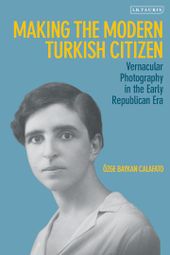
Making Turkey, Representing Turkey
In this shared book launch Özge Calafato and Enno Maessen will present their new monographies. The event will focus on the contents of their respective books, which both engage with the cultural history of representation, production of identity and space in Turkey’s modern history.
Özge Baykan Calafato wrote Making the Modern Turkish Citizen: Vernacular Photography in the Early Republican Era, which explores the photographic self-representations of the urban middle classes in Turkey in the 1920s and the 1930s. Examining the relationship between photography and gender, body, space as well as materiality and language, the book explores how the production and circulation of vernacular photographs contributed to the making of the modern Turkish citizen in the formative years of the Turkish Republic. The book shows a portrait of the ongoing political and social changes on the lives of the Turkish middle class, and of how they saw and wanted to present themselves, privately and publicly. Representing Modern Istanbul: Urban History and International Institutions in Twentieth Century Beyoglu by Enno Maessen explores the urban history of Beyoglu via a series of case studies which use previously unexamined archival material to tell the story of its local and international institutions. From the German Teutonia club and a centre point of Turkey’s cinema culture to influential francophone, British and German schools which educated many of Turkey’s future elite, the book charts the shifting identities of the residents of the district. These case studies reveal the effects of changing political circumstances, from the rise of nationalism to Turkey’s place in the Cold War, as well as critically examining Beyoglu’s legacy as a multicultural centre.
Following two brief presentations on the books by the authors, they will engage in a panel discussion with a discussant and the audience to discuss the synergies between their books and the significance of studying Turkey’s contemporary history through the lenses of cultural analysis and cultural history.
About the speakers
Luiza Bialasiewicz is Professor of European Governance at the University of Amsterdam and the academic co-director of ACES. As a political geographer, her work examines the intersections between geopolitics and everyday politics. Most recently, she has written on the contentious politics of the pandemic, including the politics of vaccines as well as anti-lockdown protests.
Guido Snel is a writer, translator, and assistant professor of European Studies at the University of Amsterdam. Most recently he published Negen Steden, city stories, a journey from Vienna to Istanbul, De mirreberg (2018, novel) and Huis voor het hiernamaals (2016, stories). His work is published by De Arbeiderspers.
Özge Calafato is Lecturer in Literary and Cultural Analysis at the University of Amsterdam. Her research interests lie at the intersection of photography, archives, memory and cultural identity. Since 1999, she has worked as a journalist, editor and translator focusing on photography, literature, music and film. Between 2014 and 2020 she worked as the Assistant Director for the Akkasah: Center for Photography at the New York University Abu Dhabi.
Enno Maessen is lecturer in Political History at Utrecht University. His research interests cover the fields of urban history, modern Turkey, the Eastern Mediterranean region, social movements and the politics of representation in the second half of the twentieth century. Maessen is co-founder of the Turkey Studies Network in the Low Countries (TSN), an independent, non-partisan, multi-disciplinary academic platform where researchers interested in the study of Turkey gather and share thoughts, especially in the Low Countries.


:rgb(-15)

:rgb(-25)

:rgb(8)
